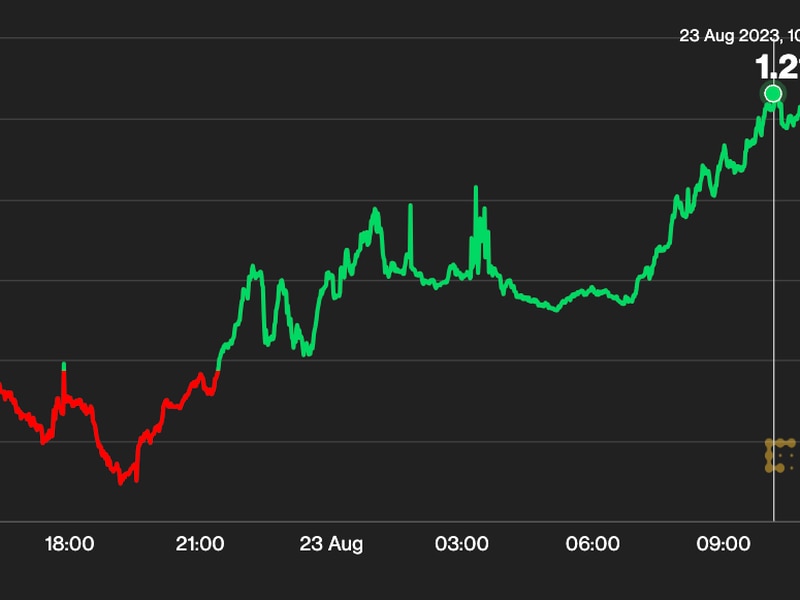The CoinDesk 50
Consensus: Distributed
Eleven years ago, Bitcoin emerged in a white paper by Satoshi Nakamoto and changed the world. Bitcoin led to Ethereum, which led to ICOs, which led to stablecoins, DeFi, Libra, CBDCs, and much more. What started with one protocol has given rise to many protocols and experiments in decentralization.
Now, as another financial crisis looms, the crypto and blockchain industry is reaching a new level of maturity. Digital assets and distributed ledgers have found uses across industries and are ready to make their mark, whether it’s paying out the stimulus or defining the post-COVID world.
CoinDesk has been covering this varied space for seven intense years. The CoinDesk 50 is our selection of the most innovative, consequential and viable projects. Together, these organizations promise another internet revolution.
Today, we reveal the first 10 names. We will be releasing the full CoinDesk 50 leading up to, and during, Consensus:Distributed, our free virtual event that starts May 11. (See how we made the choices here.)

1. Binance – Eyeing the whole pie
“It’s about the users.” That’s what Binance CEO Changpeng “CZ” Zhao said in a recent CoinDesk interview following his acquisition of well-known crypto data site CoinMarketCap for a reported $400 million. Launched in 2017, Binance has established itself as a juggernaut atop the crypto heap, becoming the dominant exchange by daily trading volume and running headlong into decentralized exchange (DEX) services, initial exchange offerings (IEOs) and over-the-counter (OTC) trading. The firm’s aggressive market moves have hardly shown signs of exhaustion either. As one CoinDesk source put it in early April, the firm is “flush with cash” even after closing nine M&A deals in 2019 alone. GET THE FULL STORY
2. Ethereum – Still leading the pack
The second-largest blockchain by market cap now boasts more developers building, reconfiguring and experimenting than any other chain. Six years in, Ethereum’s rails have enabled several big crypto trends, from the 2017 ICO boom to decentralized finance (DeFi). While copycat chains look to unseat “the world’s computer,” Ethereum still reigns dominant. Just recently the network has seen a surge in U.S. dollar-pegged stablecoins, including Tether and USDC, which, data suggests, are being used as a hedge against market volatility and genuine means of exchange. With the planned upgrade Ethereum 2.0, beginning this summer, Ethereum looks to improve its functionality and performance and finally deliver proof-of-stake and shard chains.
3. Fidelity – The weight of Wall Street
With more than $8.3 trillion in total client assets, Fidelity is bringing institutional weight to crypto markets. In 2015, CEO Abigail Johnson signed off on a bitcoin mining experiment. Four years later, its Fidelity Digital Assets arm, led by CEO Tom Jessup, added a custodial business and crypto trading service for family offices, financial advisors and hedge funds. A frequent investor in the space, Fidelity has backed data high-flyer Coin Metrics and the Hong Kong-based BC Group exchange, and pursues distributed tech R&D with its in-house Fidelity Labs. Fidelity CEO Johnson has predicted crypto will “fundamentally change market structures and perhaps even the architecture of the internet itself.” Fidelity’s role is to see that through.
4. Libra – Ruffling feathers, finding peace?
When Facebook announced libra last summer, it changed the game for digital currency. Suddenly, here was a 2.6 billion-user company betting on the future of money and nobody – from regulators to Silicon Valley – could ignore the subject anymore. Soon China’s central bank was rushing out its CBDC initiative, and Congress was holding hearings. Whatever else you think of Facebook, it has arguably done more to advertise crypto than any other entity. To quell an enormous international backlash to its original intentions, the Libra Association that will govern the currency now plans to issue multiple fiat-backed stablecoins rather than its own currency. Some say Facebook and the Libra Association have “scaled back” their ambitions. But it’s also possible they have found a way to be respectable while building off the post-crisis stablecoin surge.

5. Square Crypto – Dorsey’s bit bet on bitcoin
Twitter co-founder and Square CEO Jack Dorsey has long demonstrated his admiration for bitcoin, once saying it will eventually become the internet’s single currency. Dorsey says he spends $10,000 a week stacking sats, while his company Square Crypto continues to act as an accelerator for bitcoin dev projects, including BTCPay and Lightning Labs. Things could get really interesting if and when Square decides to integrate bitcoin tech closer to its stack (it’s a separate entity currently). Square’s CashApp already lets merchants accept payments in crypto and CashApp recently received the go-ahead to function essentially as a bank, raising all sorts of possibilities. Dorsey survived a coup on his Twitter position recently and looks ready to play the waiting game on bitcoin tech.
6. Cosmos – The dream of anti-maximalism
Cosmos is building the tools to connect a multiverse of blockchain projects together. Launched in April 2019, the $590 million network places interoperability at the core of its project, a blockchain that will be able to translate data from one chain to another, in any programming language and across all consensus algorithms. “The premise for Cosmos is that we are the least-maximalist-possible project,” All in Bits, Inc. core developer Sunny Aggarwal said. “We just want to connect everything together.” While concord is Cosmos’ aim, the project has been rife with internal fragmentation. All in Bits director Zaki Manian left the project and criticized its CEO Jae Kwon for focusing on a side project, while the company itself has split in two. Despite this, Cosmos has attracted the participation of about 100 validators on its proof-of-stake network, and is used by more than 80 companies and projects including Binance and Oracle International Corporation. GET THE FULL STORY
7. Coinbase – Crypto’s friendly custodian
Crypto’s first unicorn, Coinbase still leads among US-based exchanges. A common onramp for crypto newbies seeking ease-of-use, eight-year-old Coinbase has opened 35 million accounts and manages approximately $21 billion in assets, making it one of the largest custodians in the space. Coinbase’s success in attempting to make crypto safe for all is a double-edged sword, however, with many in the industry placing it center in the “not your keys” controversy. The firm’s merchant services wing Coinbase Commerce also provides training wheels for retailers, and has processed $200 million in transactions in two years. Co-founder and Chief Executive Brian Armstrong has said within a decade nearly 1 billion people will participate in the crypto economy, a system that is “more global, more fair, more free and more efficient,” and Coinbase will likely take them there.

8. ConsenSys – Spinning its wheels and driving innovation
Brooklyn-based Ethereum powerhouse ConsenSys has sometimes been criticized for a scattergun approach to business development. In the heady days of 2017, its mesh of spokes ranged far-and-wide to energy, media, music, personal identity and dozens of other imaginative bets founder and Ethereum OG Joe Lubin seemed to make more out of hope than expectation. In reality, ConsenSys, which burned through $100 million since 2016, has needed to cut back more than once to keep itself coherent. But now, following a partnership with Hyperledger and the launch of Codifi, it looks well placed to ride favorable trends in enterprise blockchain, DeFi and trade finance.
9. IBM – Big Blue writes blockchain history
Among the old-line giants of American computing, they don’t come any bigger than IBM. Big Blue has a central place in the history of moving information around, and recently it’s been betting its future on distributed ledgers and related ingenuity. “Blockchain is a new class of enterprise application,” Jerry Cuomo, IBM’s vice president of blockchain technologies, said previously. The New York powerhouse has applied for over 100 blockchain-related patents. Through its enterprise blockchain Hyperledger Fabric, IBM is testing DLT across healthcare, shipping and agriculture. Its Health Utility Network, which creates a manipulation-proof ledger for patient medical histories, includes insurance lines like Cigna and Anthem. The IBM Food Trust tracks thousands of food supply chains and counts retailers like Walmart and Carrefour. And in TradeLens, a global shipping industry blockchain used by more than 100 organizations, IBM has the likes of Maersk under its advisement.
10. Chainalysis – Chainalysis grabs headlines and criminals
When a big federal investigation broke up a massive child porn ring earlier this year, data sleuthing outfit Chainanalysis tracked pedos directly back to the wallets. It was not the only headline-grabbing intervention by the NYC firm, led by Michael Gronager, has been involved with. Over the last five years, Chainalysis has taken in more than $10 million in contracted work for various U.S. government departments, dwarfing its competitors in the blockchain surveillance industry, while helping to track countless unscrupulous individuals. The company, which sells anti-money laundering software to bitcoin businesses, also reportedly helped suss out the Hermit Kingdom’s vast crypto trove. “What we found is that the different types of crime and illicit activity that these agencies need to be able to prevent means that our appeal has become much broader, and our role expanded,” Jonathan Levin, co-founder of Chainalysis, has said.
More to come
Stay tuned for Day 2 of the CoinDesk 50 on Friday.
Consensus:Distributed is CoinDesk’s free, virtual convention featuring 150 leading personalities from the crypto and blockchain. Register here.








